1 What is Asparagus?
Origin and Characteristics of Asparagus
With the scientific name Asparagus officinalis, asparagus is a perennial plant native to Asia. It is highly nutritious and popular in European and American countries. Asparagus has a small spear-like shape, a grassy body, and a crisp, sweet taste. It is commonly cultivated in the US, Mexico, and China, and only the spear part is used as a vegetable.
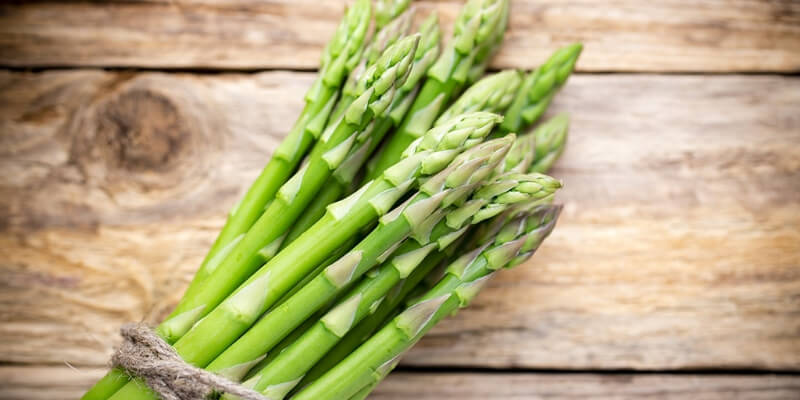 Asparagus is a perennial plant native to Asia.
Asparagus is a perennial plant native to Asia.
Classification of Asparagus
There are currently three different types of asparagus, but they have similar nutritional content. They are distinguished based on their color.
- Green Asparagus: This variety has a green color, grassy body, and bush form. It has higher economic value. Green asparagus has a saltier and more bitter taste compared to the other two types.
- White Asparagus: Similar to green asparagus, but it is grown in the dark and cannot produce chlorophyll. As it cannot be grown in large quantities, it is the most expensive type.
- Purple Asparagus: Contains anthocyanins, a compound that gives it its unique color. Purple asparagus has less fiber, is softer, and sweeter than green and white asparagus. It also has a fruity flavor when cooked.
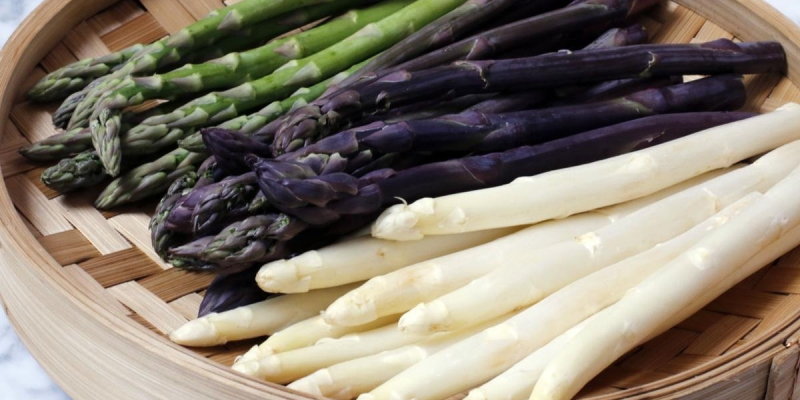
Nutritional Value of Asparagus
Nutritional value per 100g of asparagus:
| Calories (kcal) | 20 |
| 0.1g | |
| 0mg | |
| 2mg | |
| Potassium | 202mg |
| Carbohydrates | 3.9g |
| 2.1g | |
| 2.2g | |
| 5.6mg | |
| Iron | 2.1mg |
| Vitamin B6 | 0.1mg |
| Magnesium | 14 mg |
| Calcium | 24 mg |
Choosing Asparagus
As mentioned earlier, there are several types of asparagus, but green asparagus is the most common. When choosing asparagus, consider the following:
+ Time: It is best to buy asparagus in the morning to select the freshest and crispest spears.
+ Color: Choose asparagus with a deep color; for green asparagus, go for a deep green hue.
+ Stem: Opt for small, slender buds that are soft but not mushy.
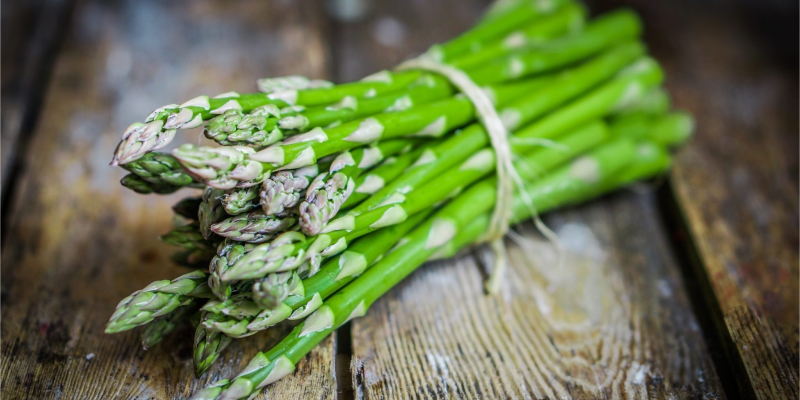
2 Health Benefits of Asparagus
Supports Fetal Development
Asparagus is rich in folate (vitamin M), which is essential for fetal development. It helps reduce the risk of birth defects and low birth weight. Additionally, its diuretic properties can help pregnant women reduce edema and fluid retention.
Reduces Menstrual Symptoms
Women often experience symptoms like bloating, fatigue, depression, and menstrual cramps before and during their period. Fortunately, asparagus extract can help alleviate these symptoms by regulating blood loss and maintaining hormonal balance.
Improves Reproductive Health
According to Ayurvedic medicine, asparagus root can enhance libido in both men and women, making it useful for hormone regulation and treating sexual disorders. In women, asparagus treats menopause and anemia, and it positively affects the mammary glands, improving the quantity and quality of breast milk. For men, it increases libido, reduces anxiety, and improves both the quantity and quality of sperm.
 Asparagus improves reproductive health.
Asparagus improves reproductive health.
Aids Digestion
Asparagus contains a high amount of inulin, a type of prebiotic complex carbohydrate. Inulin is not digested until it reaches the large intestine, where it is fed on by beneficial lactobacilli bacteria. This helps the body absorb nutrients more effectively. Asparagus is also a good source of fiber, which has a laxative effect, supporting smooth digestion, relieving constipation and bloating, and reducing cholesterol levels.
Promotes Cardiovascular Health
Asparagus contains a flavonoid called rutin, which has anti-inflammatory properties. It is often used to treat hemorrhoids and prevent blood clots. Rutin also improves capillary permeability, reduces blood viscosity, lowers high blood pressure, and decreases cholesterol levels, thereby supporting cardiovascular health.
Supports Nervous System Health
The phytoestrogen content in asparagus reduces the risk of neurodegenerative diseases like Alzheimer’s, Huntington’s, and Parkinson’s. These diseases are either genetic or caused by periodic damage to nerve cells, which the body cannot replace.
 Asparagus supports nervous system health.
Asparagus supports nervous system health.
Controls Diabetes
The mineral chromium in asparagus helps regulate blood sugar levels, improving insulin regulation and preventing diabetes, including type 2 diabetes.
Protects Vision
Asparagus is rich in vitamin A, which promotes healthy vision. It also contains antioxidants that protect the retina from damage caused by free radicals. Glutathione, found in asparagus, reduces the risk of night blindness and cataracts.
Maintains Homocysteine Levels
Asparagus is a good source of B vitamins, which help maintain moderate homocysteine levels in the blood. Vitamins B6, B12, and folate convert homocysteine into cysteine and then into the amino acid methionine during the normal methylation cycle. In other words, B vitamins are crucial for maintaining blood sugar levels by balancing the metabolism of sugar and starch. A deficiency in B vitamins can lead to serious health issues such as blood vessel damage, venous thrombosis, atherosclerosis, and heart rhythm disorders.
Treats Hangovers
Hangovers are physiological effects that occur when the body absorbs too much alcohol. Common symptoms include anxiety, fatigue, and gastrointestinal disorders like nausea and dehydration. Asparagus shoots and leaves contain a significant amount of amino acids and minerals, which help reduce hangover effects and protect the liver from the harmful effects of alcohol.
 Asparagus helps prevent cancer.
Asparagus helps prevent cancer.
Prevents Cancer
According to a study published in Cancer Letters, asparagus shoots contain saponins, which have the ability to induce cell death and prevent tumor growth. Asparagus also provides the body with glutathione, a compound with antioxidant and detoxifying properties.
In addition to the benefits mentioned above, asparagus can also help treat various conditions such as urinary tract infections, arthritis, tuberculosis, and depression.
3 How to Prepare Asparagus
Asparagus is used like other vegetables in cooking. Before preparing asparagus, wash it thoroughly with diluted water, and cut it into desired lengths. If the asparagus is slightly old, trim and peel the lower part of the stem.
Blanching the asparagus in boiling water and then plunging it into ice-cold water before cooking will help it retain its beautiful color. Asparagus cooks quickly, so add it towards the end of the cooking process, using high heat to preserve its crispness and sweetness.
Avoid using iron pots and pans to cook asparagus, as it reacts with iron, causing the cookware to change color and producing toxic compounds that can lead to food poisoning.
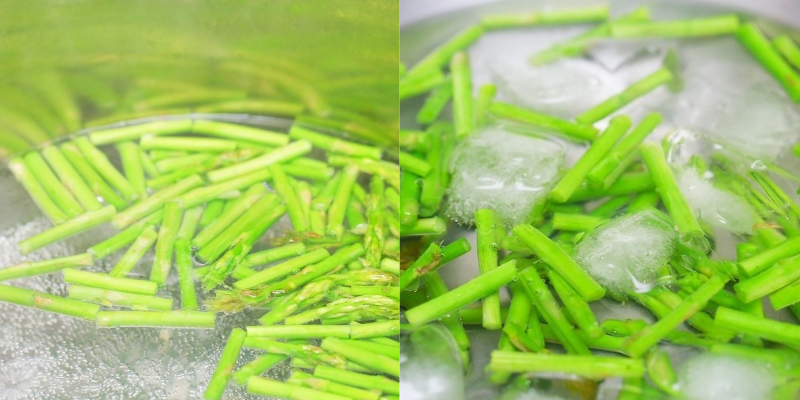
4 Precautions and Storage Methods for Asparagus
– Do not consume excessive amounts of asparagus, as it can lead to dehydration. It is recommended to eat it in moderation, about 2-3 times a week.
– People with edema, high blood pressure, gout, or allergies to asparagus should avoid consuming it.
– To store asparagus for an extended period, ensure that the spear tips remain dry. The storage method will determine how long it can be kept.
– 3 – 4 days: Roll the asparagus in a damp paper towel and store it in the refrigerator.
– 1 week: Stand the asparagus in a container of cold water for 2-3 minutes, then wrap it in a damp cloth and store it in the refrigerator.
– 2 – 3 weeks: Cut off a small part of the stem, stand the asparagus in a glass of water, and cover the spear tips with a plastic bag. Store it in the refrigerator.
– Older asparagus: Stand it in a glass of water at room temperature. It will continue to grow, and after a week, you can cut off the young spears for use.
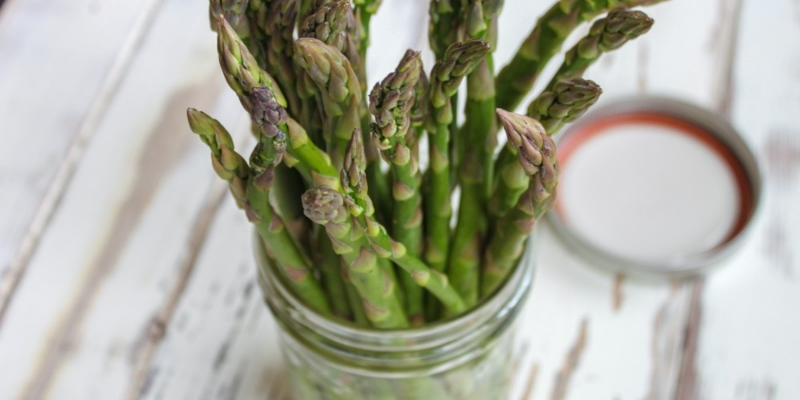
5 Delicious Asparagus Recipes
Stir-fried Asparagus with Shrimp
If you’re tired of steamed shrimp, try this delicious and nutritious stir-fried asparagus with shrimp dish!
Crab and Asparagus Soup
This soup may be a bit intricate, but it’s incredibly tasty and nutritious. The sweetness of the crab blends beautifully with the crispness of the asparagus.
 Crab and Asparagus Soup
Crab and Asparagus Soup
Chicken Rolls with Asparagus
Check out this super delicious and nutritious recipe! Chicken rolls with asparagus are a unique and healthy dish for you and your family.
Pork Belly Rolls with Asparagus
This dish is easy to make and extremely tasty. Give it a try!
Stir-fried Asparagus with Garlic
Try this simple yet mouthwatering recipe! The crisp asparagus stir-fried with fragrant garlic is sure to be a hit.
 Stir-fried Asparagus with Garlic
Stir-fried Asparagus with Garlic
Asparagus Pasta
For pasta lovers, this asparagus pasta is a must-try! It’s easy to make and results in a sweet and savory dish.
Stir-fried Asparagus with Beef
When it comes to delicious asparagus dishes, we can’t forget stir-fried asparagus with beef! The crisp asparagus and tender beef marinated in a flavorful sauce make for a mouthwatering combination.
 Stir-fried Asparagus with Beef
Stir-fried Asparagus with Beef
6 Frequently Asked Questions about Asparagus
 Frequently Asked Questions about Asparagus
Frequently Asked Questions about Asparagus














